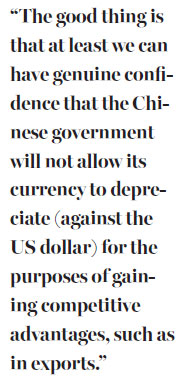There's no basis for yuan depreciation in long run
Updated: 2016-03-04 07:59
By Hu Yuwei(China Daily Europe)
|
|||||||||
China does not want a currency war, which hurts everyone; instead, the currency will fluctuate within a managed range
Of all the issues discussed at the G20 meeting for finance ministers and central bank governors in Shanghai on Feb 26 and 27, exchange rate policy was one of the most important.
"We reiterate that excess volatility and disorderly movements in exchange rates can have adverse implications for economic and financial stability. We will refrain from competitive devaluations, and we will not target our exchange rates for competitive purposes," reads a statement released after the meeting.
This reveals that G20 countries are seriously concerned about the volatility of foreign exchange markets, which the world has experienced in the recent past, and consequently their impact on global economic growth. Also, by stating that G20 members should not engage in currency devaluation, it shows the concern of possible "currency wars" between G20 and/or non-G20 members. Whether or not the world can avoid a "currency war" to a large extent depends on the actions of national governments and their willingness to listen to the calls from the G20 finance ministers and central bank governors.

The good thing is that at least we can have genuine confidence that the Chinese government will not allow its currency to depreciate (against the US dollar) for the purposes of gaining competitive advantages, such as in exports. There are several reasons behind this rationale.
First, China does not have the motivation for deliberate currency devaluation. China is the largest exporter in the world, and the renminbi is already a major global reserve currency. If the yuan were manipulated to the detriment of other countries, it would be highly possible that governments in countries that produce similar products as Chinese exporting industries also would devalue their currencies, so as not to be disadvantaged in the competition of exporting products. A "currency war" is a lose-lose situation. Thanks to the Chinese government's good reputation in the 1997 Asian financial crisis in terms of keeping the yuan stable despite the falling exchange rate of almost all Southeast Asian currencies, we have reasons to believe in China this time, too.
Second, the fundamentals of the Chinese economy are not supportive of yuan depreciation from medium- and long-term perspectives. Indeed, the growth rate of the Chinese economy is slowing, from high to moderate speed, which reflects the new normal. Today, China is paying more attention to quality of growth rather than speed of growth.

Slower growth is only one side of the story. If we look at other indicators of the Chinese economy - domestic consumption, high-tech industry, employment rate - it is in fact growing in a healthier manner. Therefore, when combined, the positive and improving fundamentals of the Chinese economy should support a stronger yuan rather than a weaker one.
Third, the People's Bank of China introduced a new renmnibi index, the China Foreign Exchange Trade System index, in December. It means the yuan's performance is now also measured against a basket of currencies rather than just the US dollar. The main purpose is to reflect RMB movement in a more accurate and realistic manner, in comparison with the bilateral dollar-yuan exchange rate.
Given that the market is gradually accepting the new index, discussions on the so-called devaluation, which always implicitly refers to the dollar-yuan exchange rate, will be of less significance. As a result, the Chinese government will be under less pressure to focus on the dollar-yuan exchange rate unilaterally, and manage the related rate accordingly.
Taking into account all these factors, we should be reasonably assured that the renminbi will not witness continuous and sizable devaluations. However, it does not mean that exchange rates of the yuan will not fluctuate. For example, according to the RMB index, since January, the yuan's exchange rate has experienced fluctuations but in a marginal manner, such as declining from 99.96 on Jan 8 to 99.29 on Feb 26. This movement is reasonable and reflects market behavior.
Given the guiding principle of marketization regarding the renminbi reform agenda, as stressed repeatedly by senior Chinese officials, the yuan exchange rate will move up and down constantly, although the range of its fluctuation is largely managed by the central bank, at least for the foreseeable future.
The author is a research fellow at Renmin University of China's Chongyang Institute for Financial Studies. The views do not necessarily reflect those of China Daily.
Today's Top News
Inspectors to cover all of military
Britons embrace 'Super Thursday' elections
Campaign spreads Chinese cooking in the UK
Trump to aim all guns at Hillary Clinton
Labour set to take London after bitter campaign
Labour candidate favourite for London mayor
Fossil footprints bring dinosaurs to life
Buffett optimistic on China's economic transition
Hot Topics
Lunar probe , China growth forecasts, Emission rules get tougher, China seen through 'colored lens', International board,
Editor's Picks

|

|

|

|

|

|







